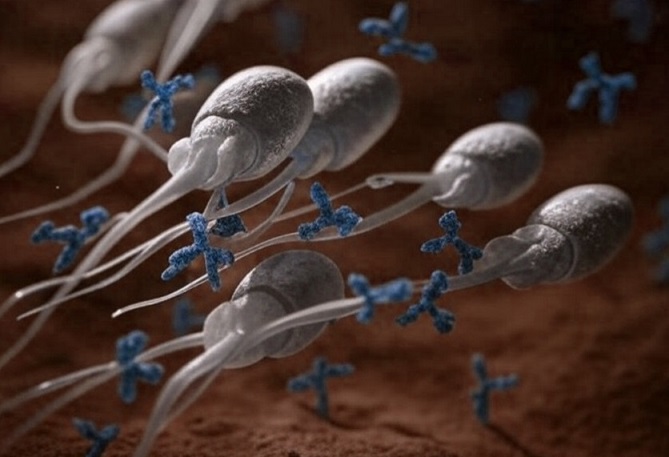Emergence of Antisperm Antibodies Causing Infertility Issues in Men Who Had COVID-19 Infections or Vaccines
Nikhil Prasad Fact checked by:Thailand Medical News Team Feb 01, 2025 2 months, 1 week, 5 days, 10 hours, 39 minutes ago
Medical News: A recent study conducted by researchers from King Abdulaziz University in Jeddah, Saudi Arabia, and Dubai Medical University in the UAE has brought to light potential concerns regarding male fertility following COVID-19 infections or COVID-19 vaccination. The study suggests a possible link between the development of antisperm antibodies (ASA) and infertility in men who have received the vaccine or had COVID-19 infections.
 Emergence of Antisperm Antibodies Causing Infertility Issues in Men Who Had COVID-19 Infections or Vaccines
Understanding Antisperm Antibodies and Male Infertility
Emergence of Antisperm Antibodies Causing Infertility Issues in Men Who Had COVID-19 Infections or Vaccines
Understanding Antisperm Antibodies and Male Infertility
Antisperm antibodies are immune system proteins that mistakenly target and react against a man's own sperm cells. This immune response can impair sperm function, leading to challenges in achieving pregnancy. While the presence of ASAs is relatively uncommon, their impact on male fertility can be significant.
Study Design and Methodology
The research team conducted a case-control study involving 133 male participants with normal sperm parameters. Semen samples were collected through masturbation for idiopathic reasons at King Abdulaziz University. The study employed molecular modeling to examine interactions between specific proteins - IZUMO1, Alpha2A adrenergic receptor, and Fibroblast growth factor receptor 2 - and IgA antibodies produced post-vaccination or infection.
Key Findings
The study's findings revealed that infertile males were distributed across various age groups: under 30 years (21%), 31-40 years (50%), 41-50 years (24%), and over 50 years (5%). Alterations in sperm motility were observed, with motility grades reported as A (8.45%), B (11.1%), C (15.8%), and D (59.8%). Liquefaction times ranged from 36 to 30 minutes across different age groups, and the percentage of abnormal sperm varied between 43.85% and 46.33%.
Molecular interactions between the studied proteins and IgA antibodies showed cumulative lengths of 25.354 Å, 39.049 Å, and 41.999 Å, respectively. Significant interactions were noted between atom chains and amino acids, with marked variations in bond lengths.
Implications of the Findings
The study suggests that male infertility peaks in the 31-40 year age group, with a decline observed in men aged 41-50 years. The presence of IgA antibodies appears to reduce sperm motility, potentially leading to immunogenic infertility, which may be exacerbated following COVID-19 vaccination or infection. The interaction between IgA antibodies and various receptors results in stable complexes that affect sperm motility, liquefaction, and increase the percentage of abnormal sperm. These disruptions in normal sperm dynamics introduce a new dimension to understanding male infertility.
Conclusion
This study highlights a potential association between COVID-19 vaccination, COVID-19 infection and the development of antisperm antibodies, which may contribute to infertility in men. The findings underscore the importance of further research to explore the mechanisms underlyin
g this association and to develop strategies to mitigate potential risks. As the global vaccination campaign continues, understanding the full spectrum of vaccine effects remains crucial for public health.
The study findings were published in the peer-reviewed journal: Current Medicinal Chemistry. (Behind A Paywall)
https://www.eurekaselect.com/article/146250
For the latest COVID-19 News, keep on logging to Thailand
Medical News.
Read Also:
https://www.thailandmedical.news/news/breaking-news-covid-19-infections-results-in-various-autoantibodies-that-target-proteins-associated-with-the-male-fertility
https://www.thailandmedical.news/news/japanese-study-finds-that-covid-19-disrupts-spermatogenesis,-global-reproductive-rates-at-risk
https://www.thailandmedical.news/news/study-warns-that-covid-19-is-affecting-semen-quality
https://www.thailandmedical.news/news/covid-19-news-study-unveils-the-impact-of-inflammatory-cytokines-on-testicular-cells-in-covid-19-male-fertility-at-risk
https://www.thailandmedical.news/news/covid-19-causes-testicular-inflammation-leading-to-testicular-tissue-damage-and-decreased-fertility
https://www.thailandmedical.news/news/texas-study-finds-that-sars-cov-2-literally-damages-the-testes-and-testicular-tissues-in-a-variety-of-way-and-also-the-blood-testes-barrier
https://www.thailandmedical.news/articles/coronavirus
